by Dr. M | May 31, 2018 | Appointment, Mark Moran, News, Office

Like our Facebook Page!
Please like and share our page to be entered into a drawing to win Iron Pigs Clubhouse Tickets for the 6/25/18 game!
Winner will be chosen 6/18/18 and tickets can be mailed or picked up at our office.

by Dr. M | Mar 21, 2018 | Appointment, Diabetes, Education, Exam, Glasses, Low Vision, Patient Care
Moran Eye Associates brings technology to patients who have low vision.

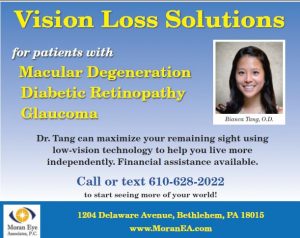
Dr. Tang offers technology solutions to help improve vision.
Bianca Tang, O.D., is now scheduling Low Vision Evaluations. She offers patients the solutions they need to make the most of the vision that they have.
People with low vision have difficulty seeing even if they are wearing glasses. These patients may have only partial sight, such as blurred vision, blind spots or tunnel vision. The cause of these issues may be macular degeneration, diabetic retinopathy or glaucoma.
Although this type of vision loss can impact people of all ages, it is primarily associated with older adults.
With the right technology, we can help patients regain the ability to enjoy improved sight both near and far.
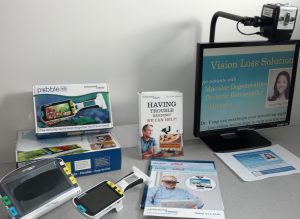
Devices available in our office.
Near Vision: Reading/Writing, Home Repairs, Needlework, Crafting, Using the Computer
Distance Vision: Watching TV, Movies, Shopping, Viewing Sporting Events and Plays.
Our goal is to help patients live more independently by making everyday tasks easier.
Dr. Tang will help patients develop strategies that lead to a more independent and active lifestyle. By pairing patients with the right magnification aids, she can maximize their remaining sight.
These devices enhance contrast, control glare, and magnify objects. Some of these tools are lightweight and portable, so you can once again enjoy reading a menu, watching a ball game or working on projects around the house.
Schedule your evaluation appointment today. Financial assistance is available for patients who qualify.
To schedule your evaluation, call or text 610-628-2022, or click for an appointment request.
by Dr. M | Dec 11, 2017 | Appointment, Cataracts, Exam, Patient Care

Live life to the fullest!
The Journal of the American Medical Association (JAMA), ophthalmology division has recently reported that women who had cataract surgery lived longer and had a lower incidence of other diseases.
In October of 2017, the JAMA article revealed the results of a large study of over 70,000 women participating in the Women’s Health Initiative. The Women’s Health Initiative is an observational study of data collected for over 2 decades. It found that over half of the participants followed in the study had cataract surgery. The most common age for the surgery was 70 1/2 years old.
It also found that women who did have cataract surgery had a lower risk of dying – due to any cause – than those who didn’t have cataract surgery. The study was not designed to determine the reason for the lower risks of vascular, accidental, neurologic, or infectious conditions. What it did suggest is cataract surgery improved a patient’s overall function keeping them healthier.
One caution: Cataract surgery for just the sake of having cataract surgery did not indicate an improvement. It is beneficial only if your doctor determined it was necessary for the improvement of your sight.
If you notice that your vision is not as clear as it once was, don’t delay, schedule a cataract evaluation with Dr. Moran.
For more information about cataracts and cataract surgery click on the following link, Understanding Cataracts
by Dr. M | Nov 27, 2017 | Appointment, Dry Eye, Exam, Experience, LASIK, Medical Eye Care, Procedure
If you have dry eye, you are not alone.
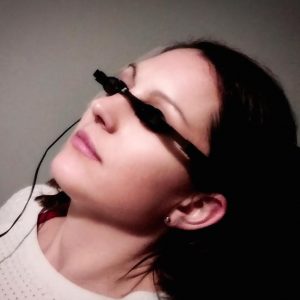 Dry eye is one of the most commonly reported eye complaints. Dry eye is a chronic medical problem that may get worse over time. We now offer in-office heat therapy treatments that target the cause of dry eye, and help preserve a healthy tear system.
Dry eye is one of the most commonly reported eye complaints. Dry eye is a chronic medical problem that may get worse over time. We now offer in-office heat therapy treatments that target the cause of dry eye, and help preserve a healthy tear system.
Dry Eye Symptoms: Along with pain, sandy or gritty feeling, and redness, dry eye can cause eye fatigue and blurred vision. It can also cause difficulty in reading or working on a computer. These symptoms can impact your daily activities.
If you have any of these symptoms but artificial tears aren’t providing relief, it may be time for heat therapy.
15-Minute Heat Therapy Treatments Now Available in our Office: Moran Eye Associates is now offering a safe, in-office, FDA-approved heat therapy. Dr. Moran recommends starting with four 15-minute weekly treatments to help improve the quality of your tear film.
Here’s How Heat Therapy Works: Heat therapy targets one of the major causes of dry eye, Meibomian Gland Dysfunction (MGD). The meibomian glands, which are located in your upper and lower eyelids, provide an essential part of your tear film, lipids (oils). If these glands are blocked, the quality of your tear film suffers. Without these oils, tears evaporate too quickly.
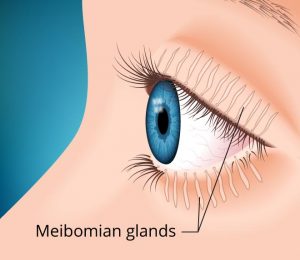
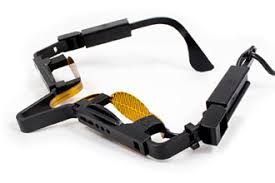
Heat therapy clears blocked meibomian glands, allowing the lipids to flow, and tear film to improve
What Happens During Treatment? While you are seated in a recliner, a technician will adjust the therapy glasses for optimal results. Then, you can sit back, relax and enjoy 15 minutes of targeted heat therapy. A week later you can return for a repeat treatment
How Do I Get Started? Schedule your appointment for a tear film evaluation to see if this treatment is right for you. Once Dr. Moran confirms the diagnosis of the Dry Eye Syndrome/MGD, you can start treatment right away.
Call to schedule your evaluation appointment 610-628-2022.
Pricing: $59 for the 1st Treatment.
Package of 4 additional treatments: $179
For optimal results, Dr. Moran recommends starting your therapy with weekly treatments.
P.S. Dr. Moran and our entire staff have used this heat therapy treatment and are impressed with our results!
by Dr. M | Nov 24, 2017 | Appointment, Exam, Glaucoma, Medical Eye Care, Patient Care
Glaucoma is known as the “Silent Thief of Sight” because it can begin to rob you of your sight before you notice any symptoms.
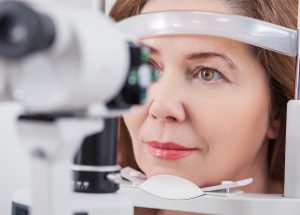
Regular exams are essential!
Regular eye exams are your best defense against the early detection and treatment of glaucoma. At each visit, we will check your eye pressure, and Dr. Moran will look at the back of your eye to examine the health of the optic nerve. These important tests can detect the start of glaucoma, and get you started on a simple treatment therapy that can save your sight.
Know if you are at risk.
According to the Glaucoma Research Foundation, people in these categories are at higher risk for developing glaucoma.
Age 60 or Older: Glaucoma is much more common among older people. You are six times more likely to get glaucoma if you are over 60 years old.
Family History: The most common type of glaucoma, primary open-angle glaucoma, is hereditary. If members of your immediate family have glaucoma, you are four to nine times higher to develop this disease.
African Descent: Glaucoma is six to eight times more common in African-Americans than in Caucasians.
Hispanics in Older Age Groups: Recent studies indicate that the risk for Hispanic populations is greater than those of predominantly European ancestry, and that the risk increases among Hispanics over age 60sisipisi.ccsisipisi.ccsisipisi.ccsisipisi.cc.
Asian Descent: People of Japanese descent are at higher risk for glaucoma.
You may NOT notice a change in your vision until irreversible damage is done.
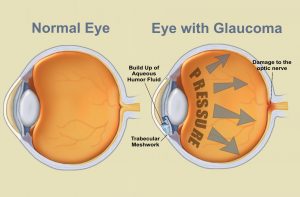
Eye with glaucoma
Many people who are in the early stages of glaucoma are unaware of their condition. When vision loss becomes noticeable, glaucoma may have caused irreversible damage.
If left untreated, glaucoma will lead to blindness. Although there is no cure, medications and surgery can help slow the disease’s progression. Vision loss occurs because increased eye pressure from glaucoma can damage the optic nerve, which carries images from the eye to the brain.
Don’t delay. Early detection and treatment is the best way to manage your condition. Dr. Moran may prescribe eye drops, which, when used daily, may be all that you need to keep your eyes healthy. If prescription eye drops are not sufficient to control your glaucoma, laser treatment or surgery may be an option.
Monitoring your progress: In addition to an eye exam, Dr. Moran may request additional tests. Glaucoma patients are monitored using annual visual field and OCT tests. Changes in your test results may indicate a need for an update in your treatment plan.
To learn more about this disease, visit the Glaucoma Research Foundation GRF.
by Dr. M | Oct 30, 2017 | Appointment, Dilation, Exam, Medical Eye Care, Patient Care, Retina, Uncategorized
DROPS, DROPS, when does it stop?
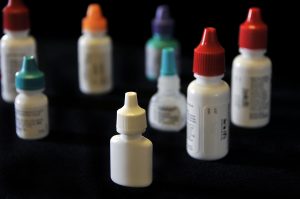
Ocular medication for dilating and glaucoma, assorted types
Patients often ask when they come in to see Dr. Moran for a complete exam, diabetic exam or cataract recheck, “Why all these drops?” Here is the simple explanation.

The eye doctor is easier than the dentist!
Getting a comprehensive eye exam without dilation, is like going to the dentist and not opening your mouth. Sure, he can see your lips and the shape of your jaw but he’s unable to see the health of your teeth.
Dr. Moran can examine the lids, lashes, and cornea (outermost layer of your eye), but to see beyond the surface, you need the drops, drops and more drops.
Depending on your age, diagnosis and health history you may receive more drops than another. Let’s discuss someone in their 60’s with diabetes or cataracts.
First, you will receive the “yellow drop”- No your eyes will not stay that color. This drop will allow us to check the intraocular pressure of your eye (glaucoma screen). It also acts as a mild numbing agent.
Next, you will receive a Phenylephrine drop. This is the drop which will dilate your pupil and allow Dr. Moran to see into the depths of the eye and examine the retina.
Lastly, comes the Mydriatic drop which paralyzes the iris muscle to keep the eye dilated for the duration of the examination.
That’s the answer to why all the drops. Now when will it STOP?
Usually, dilation lasts from 4-6 hours. It will affect your ability to work close-up and you will be sensitive to light. Blue eyes tend to stay dilated longer. It is not unusual for some patients to remain dilated for more than 6 hours, but dilation is not harmful to the eye.

You can drive if you are comfortable doing so. We recommend dark sunglasses and will provide you with them if you forget to bring yours.
Although being dilated can be an inconvenience, the benefit significantly outweighs the hassle.
Schedule your DILATED eye examination by calling or texting our office at 610-628-2022, we look forward to seeing you.
Contributed by Mandy Bolton, COA


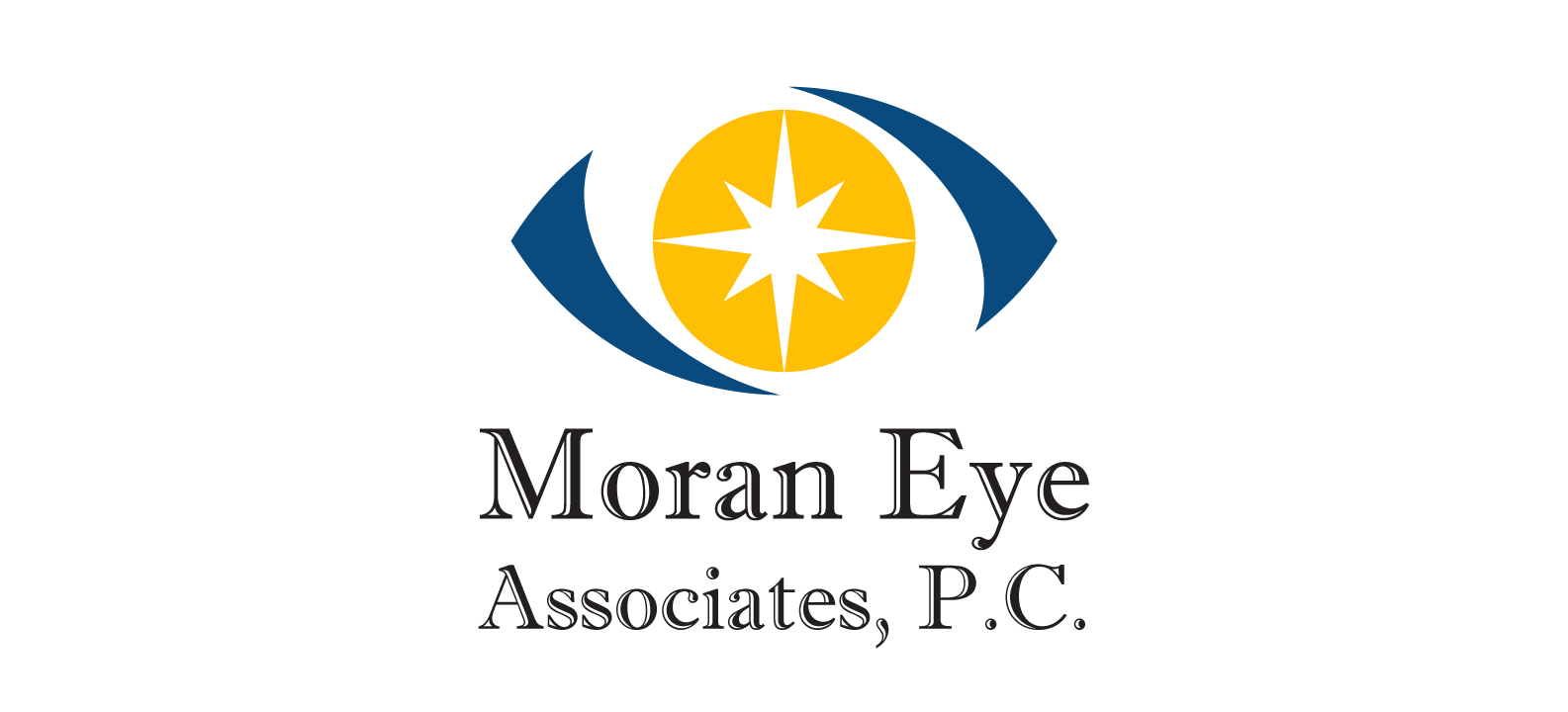




 Dry eye is one of the most commonly reported eye complaints. Dry eye is a chronic medical problem that may get worse over time. We now offer in-office heat therapy treatments that target the cause of dry eye, and help preserve a healthy tear system.
Dry eye is one of the most commonly reported eye complaints. Dry eye is a chronic medical problem that may get worse over time. We now offer in-office heat therapy treatments that target the cause of dry eye, and help preserve a healthy tear system.





